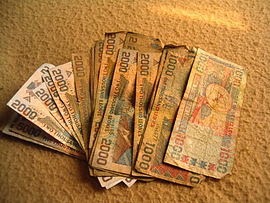Sierra Leone plans to reduce budgetary dependence
on donor support but its 2014 Appropriation Bill suggests a long way to go.
Finance Minister Dr Kelfala Marah`s
“ambitious, pro-poor” budget, presented at the end of December, 2013, still shows
a huge reliance on donor funding – about 10 per cent of the total 2.6 trillion
leones (US$600M) budget.
What`s more, the government even plans
to source its own contribution from a new tax regime recently introduced which
has raised some eyebrows.
It dramatically raises taxes on a select
group of products and services.
To encourage investors, the West African
country had run a largely liberalized tax system which the government now says deprives
it of millions.
‘The Finance Act 2013’ amended a multitude
of previous laws and harmonizes all statutes relating to revenue collection including
the Goods and Services Tax (GST), Excise Duty, and the Extractive Industry Act.
The Finance ministry said
this is the
first stage of a new policy direction aimed at ensuring sound revenue measures
and placing the national budget in tandem with new expenditure guidelines.
The goal is to increase the quota tax
contributes to pay for services like road construction, electricity generation
and other capital expenditures, said Momodou Kargbo, Minister of State at the Ministry
of Finance.
“We want to make Sierra Leone a middle
income country in the next few years and this can only be done if we strengthen
our tax law and give teeth to institutions that collect taxes,” he added.
The previous year`s
budget was consumed mainly by big infrastructure projects, a huge wages bill and
accruing interests on debts.
The 2014 budge promises to follow a similar path; particularly
with the notable announcement of a gross minimum monthly salary of 480, 000 leones
(US$100) for all public sector workers.
Parliamentarians greeted with laud applause
an 85 per cent increment on their pay, while the police, military and teachers
saw a minor increase in their monthly pay which now means they get a minimum
gross of 600, 000 leones (US$140).
But the successful implementation of all
this and more will largely depend on how much the National Revenue Authority
(NRA) collects, stresses Dr Marrah.
NRA is targeting 2.3 trillion (about
US$500M) in 2014, slightly above the previous year.
Commentators say with proper management
of its natural resources, Sierra Leone could depend far less on donor support
and it wouldn’t necessarily have to hike taxes.
Even though the economy has grown on a
modest trend, as of June 2013 the country`s external debt stood at 6 trillions
leones (a little over US$1bn).
The government blames both tax exemption
and tax evasion for revenue losses.
“At the moment we are losing a lot of
money when it comes to tax exemption,” stresses Director General of NRA, Aja
Kallah Kamara.
The new Finance law also emphasizes on
the need for foreign nationals to acquire proper documentation.
A parliamentary committee investigation
recently revealed that over a thousand foreign nationals, including highly paid
executives of mining companies, were working without either work or residence
permits.
The government said this has cost the
country huge revenues.
But concerns have also been raised by
tax increment in some quarters.
The government argues a 30 per cent tax
increment on polythene and plastic materials seeks to contain two major sources
of environmental pollution, while cigarette, a cause of a major health hazard, got
a 20 per cent tax increment.
Beverages (bears and soft drinks),
foreign entertainment and cosmetics products, got 10, 15 and 7.5 percent
increment, respectively.
Business tycoon Adonis Abboud of
Transnational Sierra Leone Limited, who is authorized agent of South Africa`s
multi choice Africa, warns 15 per cent GST discourages private sector
development.
He says high tax will automatically drive
prices up and for his pay TV services it means lesser customers.
And Sierra Leone, he warns, risks exclusion
from the Big Brother Africa show as participation in the continental competition
is determined by national subscription.
Another debate around the GST is that while
major corporate entities were exempted, ordinary Sierra Leoneans have been
paying for it on all goods purchased, except food.




0 comments:
Post a Comment
Post a Comment
Thank you for visitng this site, and please do not forget to drop a comment before leaving.